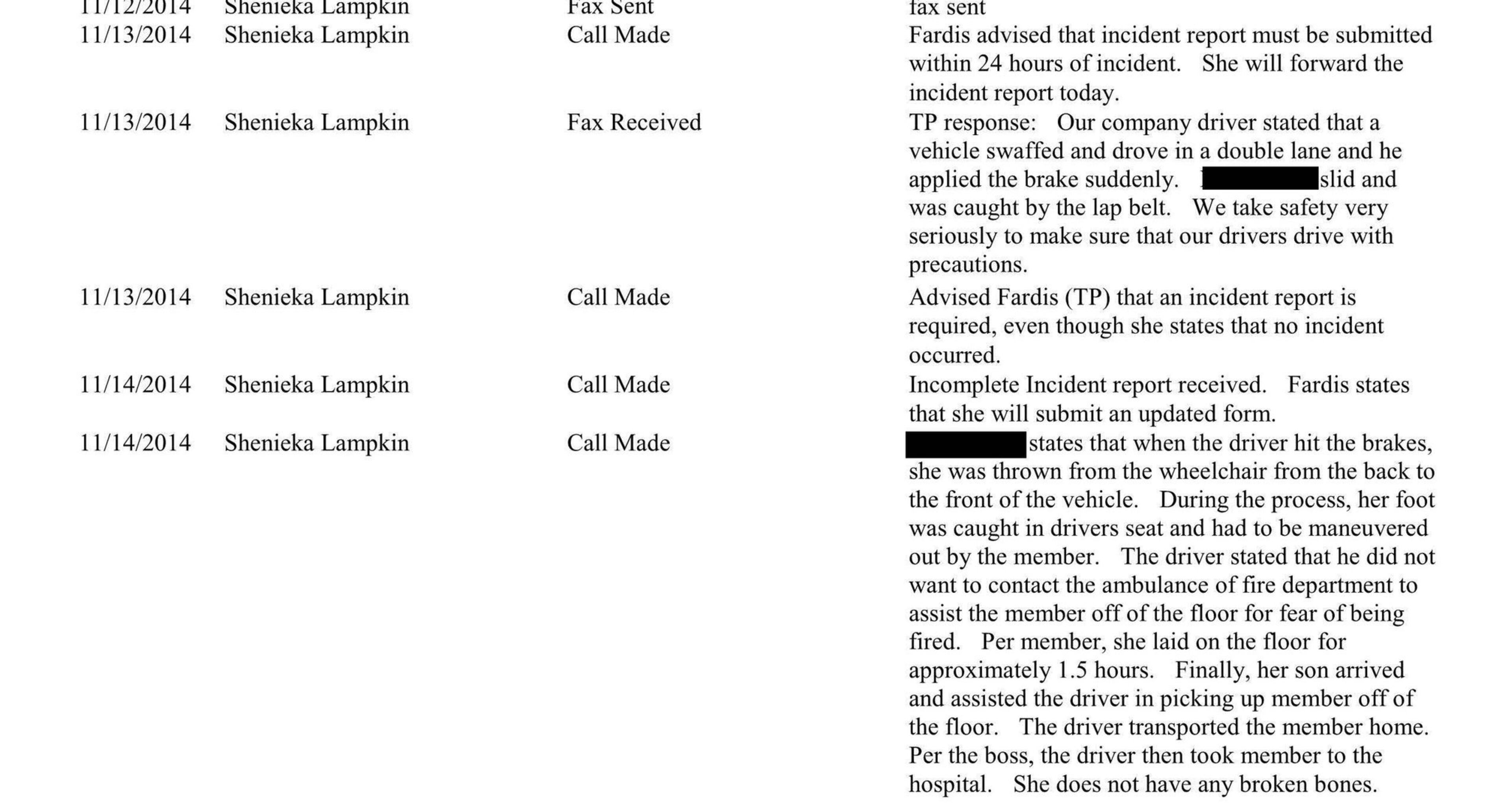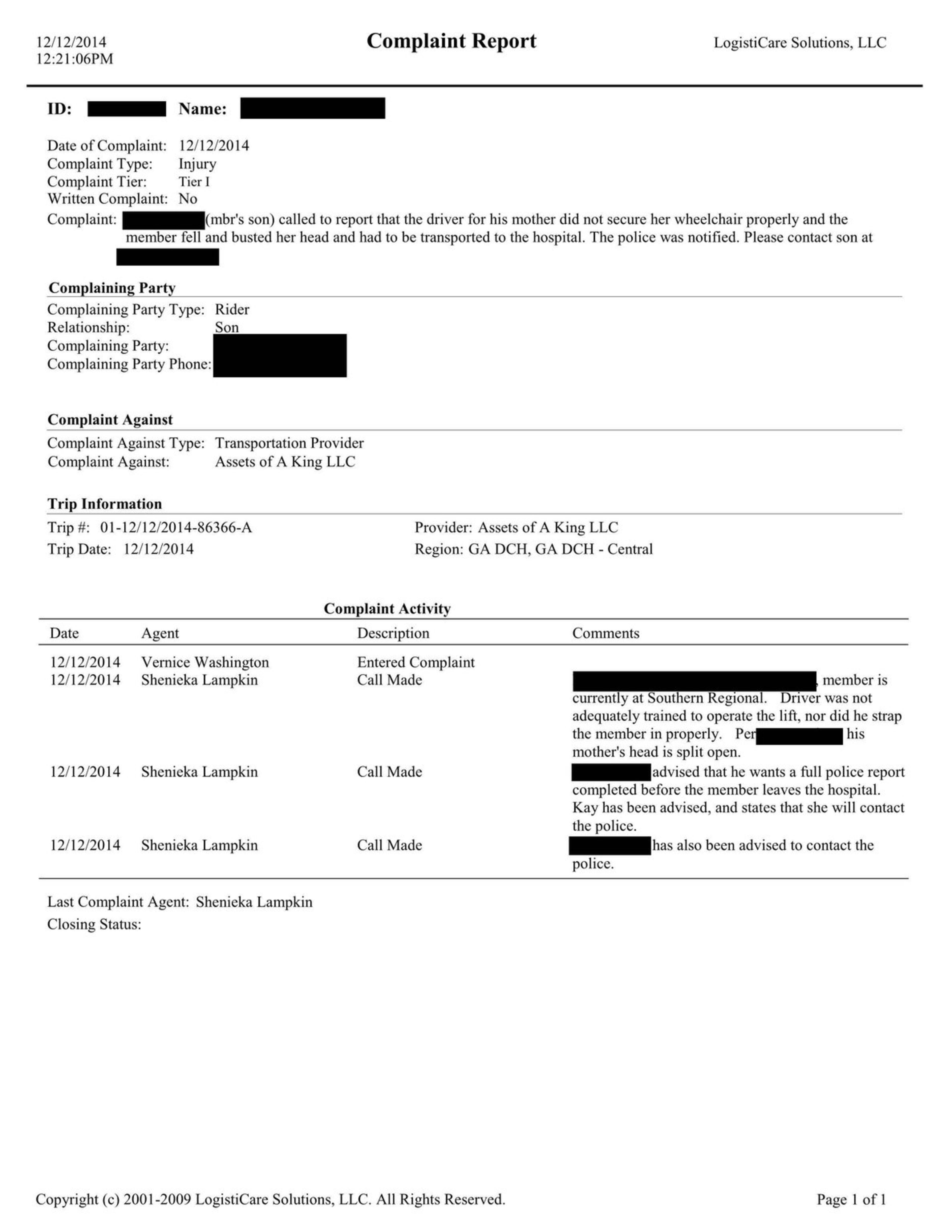Lax oversight leaves patients at risk in Medicaid rides program
The van driver didn’t strap the disabled patient’s wheelchair down, then took a shortcut through a grassy lot and hit a hole, pitching the diabetic woman with an amputated leg to the floor.
The passenger lost her left arm as a result of her fall.
Another van driver slammed on his brakes in traffic, jettisoning a woman from her wheelchair. She hit her head and dislocated her shoulder.
Other Georgia Medicaid patients have had their heads bashed, bones broken, their faces, hands and knees lacerated in incidents that could have been avoided. They’ve been propelled out of wheelchairs, or dropped from stretchers onto hard concrete, left with painful injuries that made their already-difficult lives even worse.
The Georgia Department of Community Health oversees the system responsible for driving these frail, elderly and disabled patients to medical appointments. And DCH acknowledges it is responsible for ensuring they have safe, timely transport. Yet, despite years of such incidents, and at least two cases over the past two years involving the deaths of patients who fell from chairs, DCH appears to have done little to address the issue of transport injuries or improve patient safety.

An Atlanta Journal-Constitution investigation has found that DCH doesn’t track deaths and injuries in a way that could detect troubling trends. It doesn’t impose aggressive sanctions against the contractor responsible for arranging rides throughout most of the state. The agency can’t even readily say how many staffers it has monitoring the program it oversees.
Frank Berry, appointed by Gov. Nathan Deal to head the department late last year, initially agreed to an interview for this story, then canceled it and declined to make anyone else available who could explain accountability systems for the program. Berry did not respond to an email describing the scope of the AJC's findings.
To assess the program, the AJC requested records of DCH's largest contractor, Atlanta-based LogistiCare, which is also the nation's largest manager of non-emergency transport, with operations in 41 states and the District of Columbia. Requested records included complaints, fines and other documents that might address deficiencies in patient safety.

The AJC review found the responses and fines were often cursory, involving LogistiCare pledging to do better, or shifting blame to the mom-and-pop subcontractors it chooses to provide the vehicles and do the actual driving.
LogistiCare may recommend that a driver be fired, require re-training in wheelchair securement, or reduce the rides assigned to the offending transportation provider, the AJC found.
A DCH spokeswoman said in an email that in cases of serious injuries, the department can hold its contractors accountable through fines or corrective action plans. The state can also bar a van company or a driver from giving Medicaid rides.
Yet the AJC’s review found nothing showing that DCH has addressed why similar incidents happen year after year, in different regions of the state, on vans operated by different transportation providers.
The newspaper did find DCH has taken steps to limit public scrutiny of the program. When reporters sought copies of corrective action plans, patient satisfaction surveys and contracts LogistiCare has with transportation providers, DCH turned to the company to ask if the information should be protected as a trade secret.
Georgia's open records law allows private companies to block release of documents by attaching to the records an affidavit declaring that making them public would give competitors an edge. Months after the AJC requested the records, the department said that LogistiCare had declared them all proprietary.

For its part, LogistiCare proferred the same defense it has used elsewhere when problems surfaced. It says the vast majority of rides are completed without incident or substantiated injuries. In Georgia, the company arranges two million to three million trips per year.
“You have millions and millions of miles, you are going to have some incidents or accidents,” LogistiCare’s Georgia General Manager Casey Tillman said. “There is no way around that.”
That's not how the federal government sees it. Patient injuries and deaths should never happen, not intentionally nor through negilence, according to Medicaid guidelines.
Federal guidelines also say that states must provide regular oversight and auditing of contractors to ensure that patients are transported in appropriate vehicles, that drivers are licensed, qualified, competent and courteous, and that timely transportation is actually provided.
DCH hands those responsibilities to LogistiCare, largely relying on its self-reporting to gauge contract compliance. The state allows the contractor to determine itself whether injury complaints are valid or unsubstantiated.
LogistiCare, in turn, leaves it up to transportation providers and drivers themselves to get up to speed with training. The state requires wheelchair safety, first aid, defensive driving and sensitivity training for Medicaid rides. LogistiCare is required to check paperwork to make sure that has been done.
A pattern of endangerment

The pattern of preventable incidents culminated in May with the death of a 58-year-old quadriplegic with advanced multiple sclerosis. Cindi Behrmann was descending from a van in a wheelchair lift outside her doctor's office in Conyers when something went horribly wrong.
As the lift motor churned, the chair tilted forward. Behrmann, who weighed less than 90 pounds and had brittle bones from osteoporosis, fell to the ground, striking her face on the pavement. Her 200-pound wheelchair fell on top of her.
She died later that night. The coroner ruled her death an accident.
"I don't feel it was an accident," her widower, Richard Behrmann, told the AJC. "An accident is something that's out of somebody's control."

Anyone keeping up with complaints filed about the transport system could have seen such a tragedy coming.
LogistiCare’s network of transportation providers carries people who are paraplegic, or blind, or suffer kidney failure, or whose diabetes can make any wound life-threatening. Some have dementia. Some are missing arms or legs. Some, particularly the elderly picked up from nursing homes and adult daycare centers, are so weak that they can’t stand up on their own.
The slightest mishap — a bump in the road, a fender bender — can send them spiraling into devastating health problems. That’s why it’s crucial that personnel serving them be properly trained.
In its assessment of DCH’s oversight of LogistiCare, the AJC reviewed hundreds of complaint records from the past three and a half years. Many had key pages missing or information redacted to protect privacy or were vaguely written. But the newspaper found more than 180 accounts of injuries, ranging from minor to catastrophic, that were allegedly caused by driver mistakes, mechanical problems or other avoidable issues.
About 50 of those complaints involved patients not being properly strapped in or their wheelchairs not being tied down in vehicles. More than four dozen involved mishaps during loading or unloading.

In 2014, a nurse filed a complaint that a reckless van driver, speeding and talking on his cell phone, caused an unrestrained wheelchair passenger to fall backward on her head, sending her to the hospital. The Henry County-based van company told LogistiCare “there was no incident.”
A week later, a man complained that a driver for a different Henry County transport company didn’t secure his mother’s wheelchair properly, and she fell and “busted” her head and had to be taken to a hospital.
In 2015, a wheelchair fell off a van, causing a patient to strike her head on the ground, according to a complaint filed by a LaGrange nursing home. The woman suffered “significant injury” and was takened to Grady Memorial Hospital.
In all three cases, records of fines imposed by the state don’t show DCH taking corrective measures.
The Department of Community Health has assessed LogistiCare nearly $485,000 for contract violations since 2012, when its current contract began. The state did not provide any evidence of additional fines.
In that period, the state paid the company more than $230 million, financial records show.
Most of the fines were for late rides or no-shows or for keeping callers holding on the phone for too long. The state collects via demand letters, written in boilerplate, which go out quarterly as a matter of routine. LogistiCare routinely pays up.
In all the records provided, only once did the department address anything involving wheelchair securement — a $1,500 fine over an injury in April 2015.
“The provider is required to attend a WheelChair Safety training session,” the letter from DCH said, “before future trips can be assigned to that provider.”
‘Please slow down’
Later in 2015, a patient in another wheelchair mishap died. Jessie Taylor III, a double amputee, spent three months hospitalized after his wheelchair flipped backward during a ride to dialysis in Augusta. He died Christmas Eve 2015, at age 34.
The records of assessed fines don’t show the state taking any action after Taylor’s death. The contractor’s internal investigation found the man suffered an injury “due to driver’s negligence.”
"He was in so much pain," Taylor's sister, Belinda Taylor, said. "If I'd have known this was going to happen, I would have taken him myself."

Jessie had lost his legs a few years earlier after a spider bite led to a staph infection, his sister said. He used the state’s van service to get to dialysis.
Taylor said the vans would drive too fast coming in and out of her neighborhood. “I just asked them, ‘Can you please slow down?’” she said. “‘If it’s my brother in here, or anybody, you shouldn’t even be speeding like that.’”
On the day of the accident, in September 2015, she and her mother were home when the van dropped her brother off. Something had gone wrong.
“We saw it in his face,” Taylor said. “He was like, scrunched up.”
His mother took him to an emergency room. Jessie had a fractured hip, a bruised head, a broken thigh and a sprained neck. At first, amid the pain, he said little, but eventually, they pulled the story out of him: His wheelchair overturned during transport, then a driver tried to lift him back into his chair but dropped him.
Jessie’s mother has sued, alleging negligence by LogistiCare and its subcontractor, Vidalia-based Relicare, for failing to train the driver, not locking Jessie’s wheelchair down and driving aggressively, then dropping him off at home instead of taking him to a hospital after he was injured.
According to state records of the incident, a Relicare representative initially told LogistiCare that there had been no fall — that the passenger had only leaned back in his chair and the driver caught him.
Then the driver got into trouble over a separate incident in which a woman fractured her ankle stepping into a vehicle, allegedly because he didn’t assist her. LogistiCare took a second look at the Taylor case.
The fix: Relicare fired the driver.

Driver rushes, patient falls
Asked about the Taylor case, a manager for Relicare said he doesn’t recall it. A lot of patients fell during rides in that time period, he said, and he fired several drivers.
“It’s very common to do,” Jonathan Johnson said. “A lot of that stuff comes with a rush thing. When you’re rushing to do this and rushing to do that.”
Relicare isn’t working for LogistiCare anymore. Johnson said he let the contract expire about a year ago.
In a written statement, LogistiCare called Taylor’s death “incredibly unfortunate” but said it would not discuss the case because it is in litigation.
LogistiCare says it investigates injuries, and if they’re substantiated, may recommend that the transport company suspend or re-train a driver. If another injury occurs, LogistiCare said it might ban the driver from any more of its Medicaid trips.
"It's not acceptable to anybody that these things occurred," Executive Vice President Steve Linowes said. "It's not acceptable to us, it's not acceptable to the families. Our existence as a business is really to provide controls across a very high volume of trips, and these trips are not for the general population, but it's really for the frail and vulnerable population."
DCH declined to answer the AJC’s questions about whether LogistiCare faced fines or any other sanctions as a result of Taylor’s death, citing federal patient confidentiality laws.

Another catastrophe
So far this year, about three people per month reported being hurt on LogistiCare-arranged rides, a review of complaints shows.
In February, one complaint alleges, a driver in South Georgia struck a pothole while speeding and talking on his cell phone, causing a patient to fall and bruise the back of her head.
In April, a patient fell out of her wheelchair in east Georgia when her driver slammed on the brakes. She suffered a fractured neck and cuts on her hand. According to the complaint, the driver wasn’t supposed to be behind the wheel because he hadn’t completed wheelchair training.
Then in May, driver Delroy Cunningham of Five Star Express Transit lowered Cindi Behrmann to the ground as she was headed to a doctor's office for blood work. Hours later, Behrmann was airlifted to Atlanta Medical Center, where her husband found her unconscious.
"She was in ICU," Richard Behrmann said. "They had inserted a breathing tube. So she was just laying in bed. The nurse was setting up IVs. And they said she was stable, and they were going to have to do surgery the next day. Said she had two broken legs, a broken nose and head trauma."
Later that night he went home, planning to return the next morning. Then the phone rang.
"There wasn't really anything to be done," he said. "She had passed."
Behrmann said he spoke to one of LogistiCare’s Quality Assurance investigators, who told him the wheelchair’s back wheels were still inside the van while the lift descended, causing her and the chair to flip forward.
He hired an attorney, who reached a settlement with Five Star’s insurance company for $1 million.
Five Star CEO Rebecca Morton refused to talk to the AJC for this story. The company still works for LogistiCare, which would not say what sanctions, if any, it imposed. Records show Five Star initially told LogistiCare that Berhmann caused the fall by tilting the chair forward with the breathing tube she used to control it, and that the driver caught her, but then she slid to the ground on her knees.
Her autopsy said she fell face first.
The AJC also found that the night she died, her van driver, Cunningham, 30, was pulled over for speeding and arrested on a charge of marijuana possession. A check of his criminal record found multiple marijuana charges throughout his adult life and several fender benders. In one case, he failed a drug test while on probation. But because he had no felony record and had not been in any wrecks in the previous two years, he still was qualified to drive for a LogistiCare subcontractor.
Tillman, the Georgia general manager, said those qualifications are set by the state. He noted, though, that Cunningham no longer drives for Five Star.
Cunningham didn’t respond to messages from the AJC.
DCH would not answer questions about Cindi Behrmann’s death, nor about any sanctions it may have imposed. The department again cited federal patient confidentiality laws.
But in an email, spokeswoman Fiona Roberts said if DCH received a report of a patient who was injured or died during transport, the department “would analyze and research the reported incident to determine if the injury or death is a result of a policy violation.”
As with Jessie Taylor, the AJC found no record of DCH taking action over what happened to Behrmann. For the period covering her death, the state fined LogistiCare $5,500 for late pickups and keeping patients in vehicles for too long, and $500 for flubbing a hospital pickup. There was no record of other fines.
Who’s counting?
The state told the AJC it doesn’t keep records of deaths or injuries in any form other than a stack of complaints received from patients, their relatives or medical offices, forwarded by LogistiCare.
LogistiCare provided the AJC with some year-by-year statistics on substantiated injuries and serious injuries. For this year — when Behrmann died and Five Star’s insurance settled up with her family — the figures show zero substantiated serious injuries.
“We know where you’re headed,” an emailed statement from LogistiCare said, “but it’s difficult to associate a later death with something that happened during transport, especially given the fact these individuals are often very sick with pre-existing conditions that are typically found to be the cause of their death by the medical examiner.
“We can state that LogistiCare has never been determined to be responsible for a member’s death during the Georgia contract.”
Some notable cases
- Jennifer Bivins (Macon, 2006) — Her family alleged in a lawsuit that Starship Transportation failed to secure her wheelchair or strap her in, causing her to fall and strike her head when the van started moving. The 32-year-old diabetic, who was taking blood thinner medications, was not taken to an emergency room, the lawsuit claimed. She died the next day. The family also pointed blame at the nursing home where she was receiving treatment and her dialysis center, where the van dropped her off. The case settled out of court.
- Brenda McFarland (Jonesboro, 2006) — The 54-year-old diabetic wanted to be driven home from dialysis in a car, but We Care Transportation sent a van, according to a lawsuit filed by her son, Brian. We Care personnel tried to help her into the van, but she fell and broke her leg in three places. She died about six weeks later. While the lawsuit blamed the fall, Brian McFarland told the AJC she had other health problems that probably caused her death. He said he settled the lawsuit for about $60,000.
- Sexual battery victim (Statesboro, 2008) — A woman told police that a man fondled her 19-year-old, mentally-disabled granddaughter during a ride to a doctor's appointment. In a lawsuit, she alleged that LogistiCare volunteer driver Kenneth Johnson knew that his brother, Dondi Johnson, had a prior arrest for rape, yet he allowed him to ride in the back seat. When the grandmother dozed off, his brother fondled the teen's breast and thigh, a police report said. Dondi Johnson pleaded guilty to misdemeanor sexual battery and received a sentence of 12 months probation. The lawsuit settled for an undisclosed sum.
- Patricia Ann Smith (Adel, 2012) — Last year, a jury awarded a south Georgia woman $5 million over a wheelchair spill that caused her left arm to be amputated. She already had an amputated leg. When a truck picking up tree limbs blocked the van's route, a driver for MIDS Inc. cut through a grassy parking lot and hit a hole. Smith's attorneys argued that LogistiCare's contract made it responsible for monitoring MIDS and partly responsible for driver training. The jury found LogistiCare to be 36 percent at fault, putting the company on the hook for $1.8 million. The case is being appealed. Smith died in September.
About LogistiCare:
- Formed in 1994 by John Shermyen, it's now a subsidiary of The Providence Service Corporation, based in Connecticut.
- Its headquarters are in Midtown and its Georgia call center is in Clayton County, south of the airport.
- Last year, it generated $1.2 billion in revenue and $77.1 million in operating income, according to a letter to shareholders.
- Its current CEO is Jeff Felton. He succeeded Herman Schwarz, who resigned in January.
- The company's website says it employs 3,800 nationwide and works with more than 5,500 subcontractors.
- It works in 41 states and the District of Columbia, including both Medicaid and Medicare Advantage programs.
- In Georgia, LogistiCare currently holds three of the five non-emergency medical transportation contracts.



